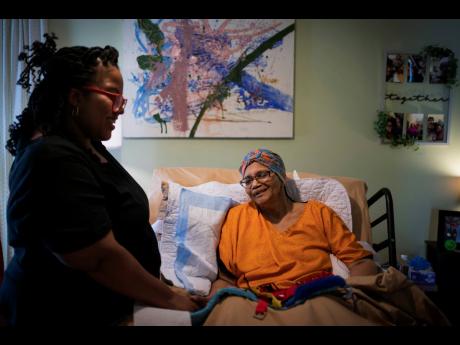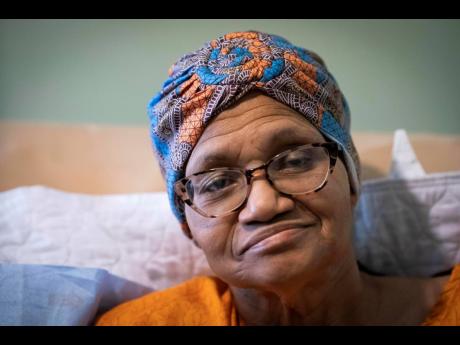A lifetime of racism makes Alzheimer’s more common in black Americans
FREDERICKSBURG, Va:
Constance Guthrie is not yet dead, but her daughter has begun to plan her funeral.
It will be, Jessica Guthrie says, in a black-owned funeral home, with the songs of her ancestors. She envisions a celebration of her mother’s life, not a tragic recitation of her long decline.
As it should be. Constance has lived 74 years, many of them good, as a black woman, a mother, educator and businesswoman.
But she will die of Alzheimer’s disease, a scourge of black Americans that threatens to grow far worse in coming decades.
Black people are more likely to develop Alzheimer’s than white people in the United States. They are less likely to be correctly diagnosed, and their families often struggle to get treatment from a medical system filled with bias against them.
About 14 per cent of black people in America over the age of 65 have Alzheimer’s, compared with 10 per cent of white people, according to the Centers for Disease Control and Prevention. The disparity is likely even more, because many black people aren’t correctly diagnosed.
And by 2060, cases are expected to increase fourfold among black Americans.
While some risk factors might differ by race, the large disparities among racial groups can’t be explained just by genetics.
The problems start much earlier in life. Health conditions like heart disease and diabetes are known risk factors. Both are more common among black populations, because of where they live in relation to polluting industries, lack of healthy food choices, and other factors. Depression, high blood pressure, obesity and chronic stress can also raise the likelihood of developing Alzheimer’s. So can poverty.
Across the board, black people don’t receive the same quality of health care throughout life as white people.
So they don’t get high-quality treatment — or any treatment — for all those conditions that are risk factors. Then, at the end, they’re less likely to get medication to ease the symptoms of Alzheimer’s and dementia-related disorders.
And there’s the insidious impact of a life experiencing racism.
Racism is trauma that can lead to increased stress, which can in turn cause health problems like inflammation, which is a risk factor for cognitive decline, said Dr. Carl V. Hill, chief diversity, equity and inclusion officer of the Alzheimer’s Association.
“But because of this structural racism that creates poor access to health, medication, housing, those who experience racism and discrimination are not provided a pathway to lower their risk,” Hill said.
It is, he said, “a one-two punch.”
For Jessica, it has meant the final years of her mother’s life have been filled not with peace, but heartache and frustration, as she navigates doctors who don’t believe her when she says her mom is suffering. In the slow, plodding walk that is her mother’s final years, she has few health-care partners.
“It has been pervasive across multiple doctors, emergency rooms and hospital doctors,” Jessica said, “Not being listened to, not believed, not given the full treatment.”
“To be a caregiver of someone living with Alzheimer’s is that you watch your loved one die every day. I’ve been grieving my mom for seven years.”
The salon was called ‘Hair by Connie’, and for 18 years it was the place to go in Alexandria, Virginia, if you were a black woman who wanted to look her best. Reigning over the shop was its owner, Constance Guthrie.
She travelled the world, attending hair shows. She opened her salon to fashion shows like the ‘Tall, Full and Sassy’ event advertised in an old flyer she now keeps in a box of mementos. She donned dazzling, colorful and flamboyant outfits to match her larger-than-life personality.
In the 1990s, she made the difficult decision to move and close her beloved salon. She bought a home in Fredericksburg so her daughter could attend the best schools, and later became a paraprofessional in the local school district, which allowed her to have a schedule where she never missed oratorical contests or choir recitals.
She was always there for Jessica, who is her only child. They often stayed up into the wee hours of the night working on school projects together. Despite meager means, Jessica grew up surrounded by encouragement and love.
“My mother gave up everything to make sure that I had the greatest support, the greatest opportunities,” Jessica Guthrie recalled, “We were like two peas in a pod.”
Her mother’s hard work paid off. Jessica became a teacher and later moved to Dallas to build her own life and chase her dreams, where she was a successful chief programme officer for an education service.
Then, seven years ago, Constance began her descent into dementia.
She started to forget simple things, like where her keys were. She lost her way coming home from work on a familiar route she travelled almost daily for 18 years. She got into a car accident.
The frequency of troubling incidents began to increase, worrying Jessica who was still hundreds of miles away in Texas.
They tried to use Post-It notes to remind Constance of daily tasks. Some of the colourful notes still line the walls of the family’s home.
For a woman who had grown accustomed to being so independent, it was hard for her to accept that she needed help.
“She spent so long trying to hide it,” Jessica said, “Like, ‘Oh, I’m good, I’m fine. I just forgot.’ But you could tell that a lot of her anxiety and stress was because she was trying to cover this up from other people.”
She began to wander around her neighborhood. Jessica and nearby loved ones tried to bolt the door to prevent her from wandering.
A neurologist confirmed she was suffering early cognitive decline and that it was likely Alzheimer’s.
She was just 66 when she was diagnosed.
Soon after, Jessica made the tough decision to pack up and leave Dallas behind to care for her mother full time. She recently began working remotely again after taking an extended leave of absence to care for her mother.
Constance never had diabetes nor high blood pressure, which are common risk factors. She was fairly active and healthy, and would often walk around her neighborhood. But in 2015, Constance suffered a transient ischaemic attack, or a mini-stroke, which is a brief disruption in the blood supply to part of the brain.
Jessica believes the mini-stroke could have been caused in part by the heavy stress her mother endured at her job, where she worked for 18 years as a special education paraprofessional.
She also questions the role genetics played in her mother’s diagnosis. Her mother’s aunts are all living with the disease. Her mother’s brother, who was a doctor, has started to experience cognitive decline.
Lost in her own mind, Constance can no longer testify to the difficulties she endured, as a mother, a black entrepreneur running a business on her own.
But her daughter, Jessica, can attest to the struggles she’s had, as a black care-giver, trying to ensure that her mother receive appropriate care.
The problems black people face getting medical care are pervasive. Black people living with serious illnesses get less help managing pain and other symptoms, and they have worse communication with doctors, according to the Center to Advance Palliative Care.
Studies show they are less likely to receive dementia-related medication that can help ease symptoms like hallucinations and depression that make the disease particularly terrifying for families.
Among non-white caregivers, half or more say they have faced discrimination when navigating health care settings for their care recipient. Their top concern: Because of their race, providers or staff do not listen to them.
And there are barriers to even being diagnosed properly. A recent study found that black participants in Alzheimer’s disease research studies were 35 per cent less likely to e diagnosed than white participants. Part of the problem is a lack of black doctors. Just one in three of the nation’s physicians is black, indigenous, Hispanic or Asian. That lack of representation has had a compounding effect on the care that black people receive, especially later in life when older Americans suffering from illnesses like Alzheimer’s lack the ability to advocate for themselves.


